How to Know if You Have Mold in Your Body. Hom Test
1 / 11
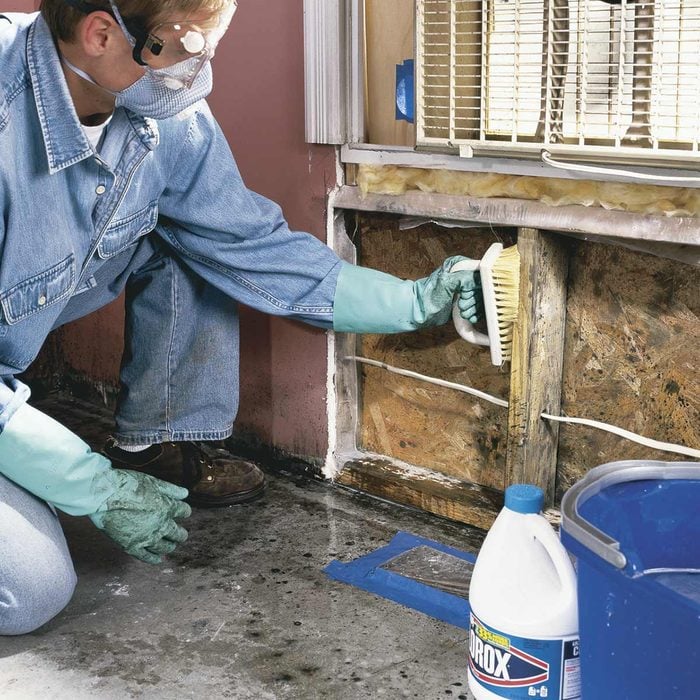
What does mold look like
Mold is everywhere. It's a type of fungus that grows from tiny spores that float in the air. Information technology tin grow almost anywhere that spores land and find wet and a comfortable temperature, betwixt 40 and 100 degrees F. Typically that includes about every damp place in your home. You lot can easily spot the nearly visible blazon of mold, called mildew, which begins as tiny, usually black spots but oft grows into larger colonies. It's 1 of the easier ways of how to tell if you have mold. It'due south the black stuff you see in the grout lines in your shower, on damp walls, and outdoors on the surfaces of deck boards and painted siding, especially in clammy and shady areas. A mildewed surface is oft hard to distinguish from a dirty 1. To test for mold and mildew and how to tell if your house has mold, merely dab a few drops of household bleach on the blackened expanse. If information technology lightens subsequently one to two minutes, you have mildew. If the surface area remains dark, y'all probably accept dirt.
2 / eleven
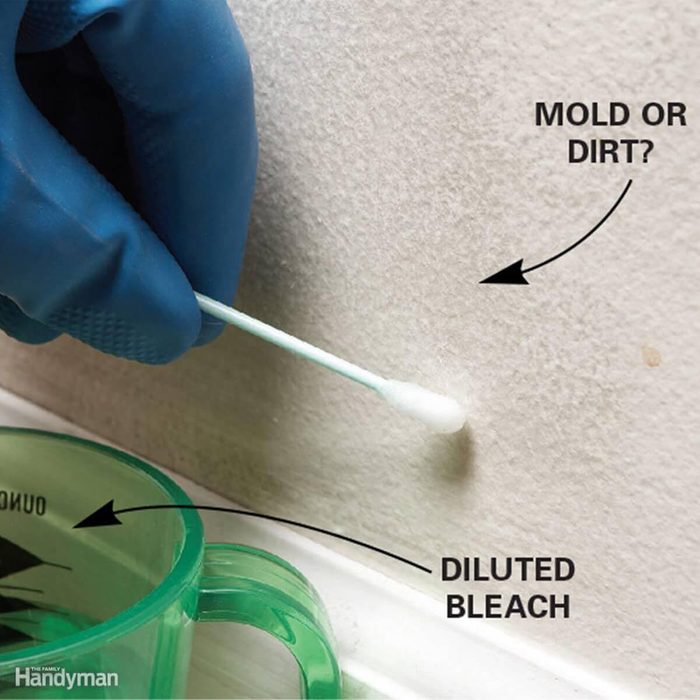
Is it Mold or Dirt?
Most mold is unmistakable, but sometimes small or largely hidden growths simply make a surface look dirty. A quick test for mold can be done when yous dip a swab in diluted bleach (ane part bleach, sixteen parts water) and dab it on the wall. If the spot quickly lightens (or keeps coming back after cleaning), assume information technology'due south mold. Mold exam kits are available that detect the presence and place the type of mold, but they won't help determine the crusade or what to do about it.
iii / xi
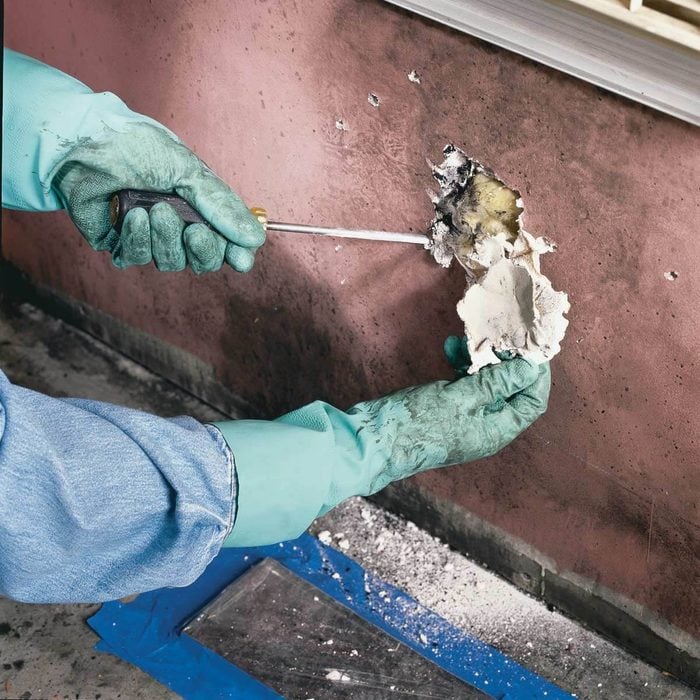
Probe the Surface area with a Screwdriver
Mildew is a surface type of mold that won't damage your home's structure. Merely other types of mold cause rot. If you desire to know how to find mold in your house, probe the doubtable area with a screwdriver or other sharp tool as a test for mold. If the forest is soft or crumbles, the fungi accept taken agree and rot has begun.
iv / xi
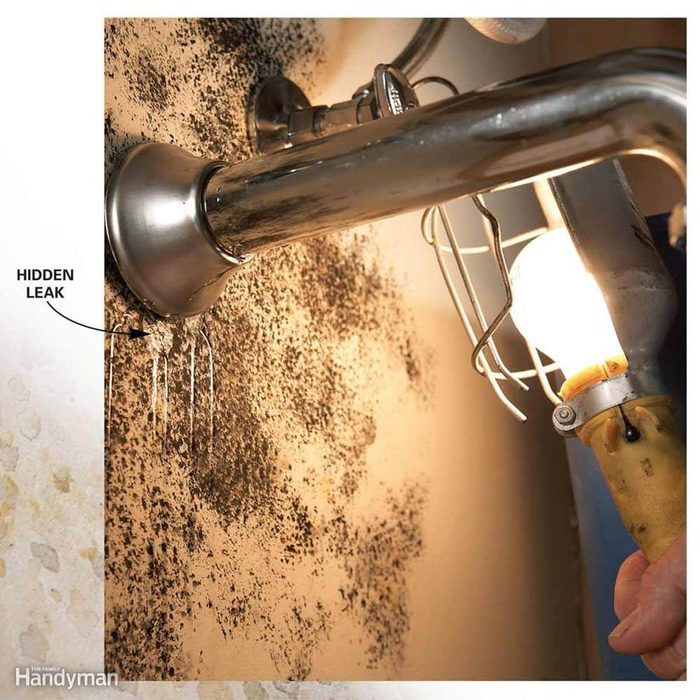
Check for Plumbing Leaks
five / 11
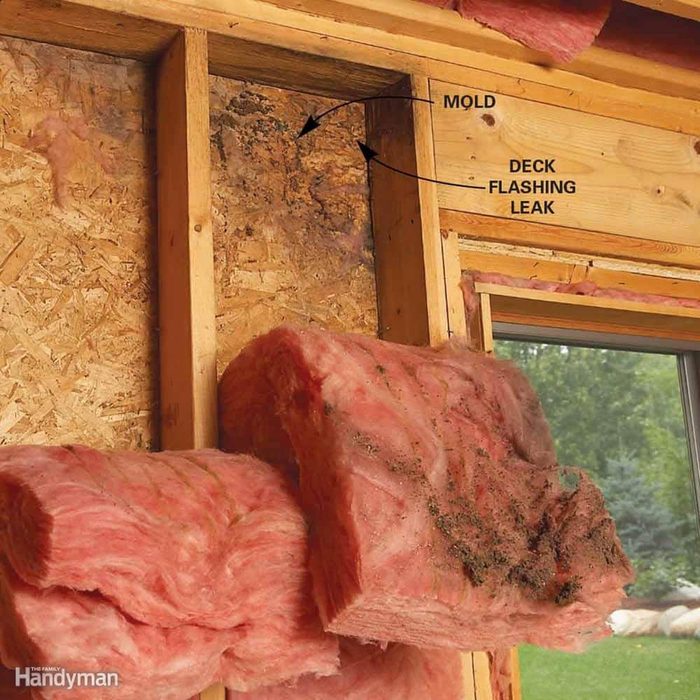
Look for Outside Leaks
If mold is growing on an outside wall or ceiling, showtime look for a leak in the wall or roof every bit a test for mold. Measure from the moldy area to a reference point like a door, and so find the spot on the other side of the wall or ceiling. Closely inspect nearby vents, roof flashing, decks, window wells and anywhere forest is rotting. Expect for footing sloping toward the business firm and downspouts emptying next to the wall. If the ground around the firm gets also moisture, moisture volition wick into the foundation or slab and get persistent dampness. Make sure you properly install flashing when you're fixing the leak.
half dozen / xi
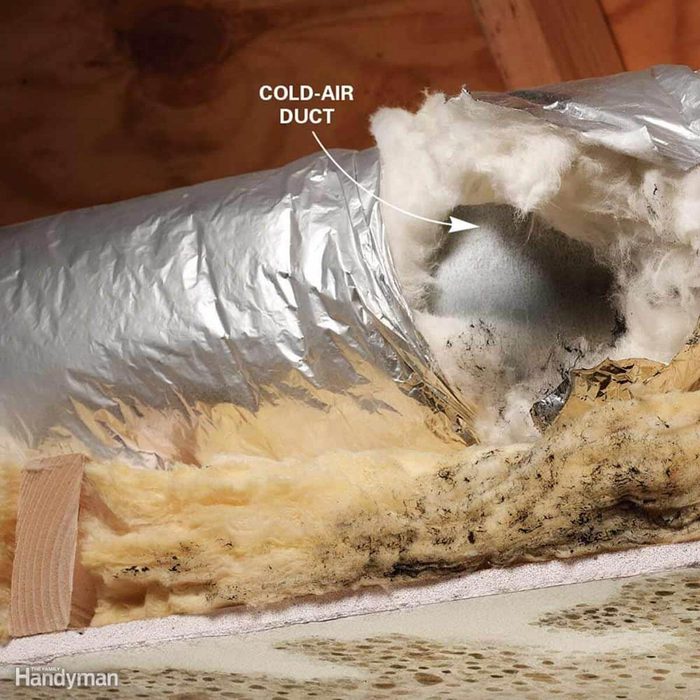
Audit the Ductwork
If mold forms on the ceiling under a duct or register and there's no sign of a roof leak, badly insulated ductwork may be the cause. Warm, moist air condenses and forms water on ducts carrying cold air through the attic or crawl space. The condensation is a sign that the duct is uninsulated or missing a vapor barrier. Eventually the water saturates the insulation and drywall and mold spores (which are everywhere) accept root. In cold weather, the reverse happens. Wet forms anywhere warm air escapes—for instance, at unsealed joints between duct sections. Inspect your ductwork equally a test for mold. Acquire how to properly insulate your basement rim joists.
7 / 11
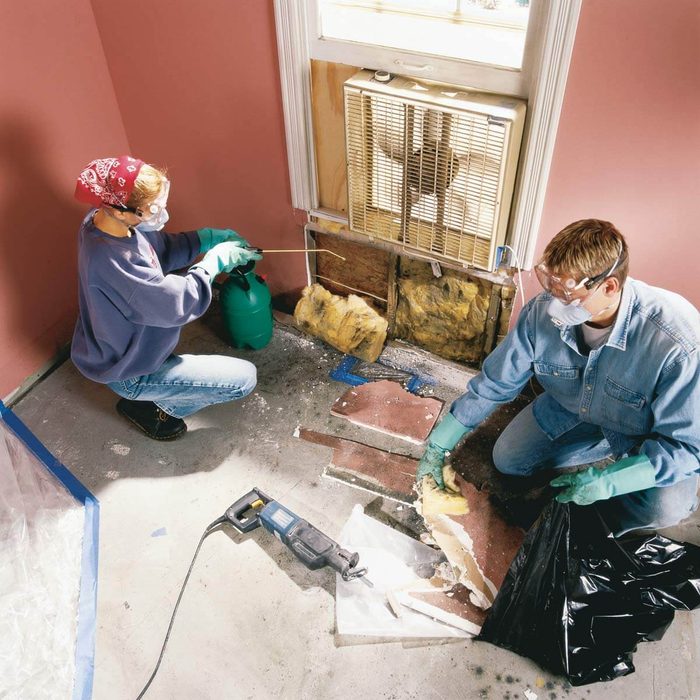
Testing the Mold
The Center for Disease Control does not recommend routine sampling for molds and information technology's generally not necessary to identify the species of mold because it's all got to get removed anyway. Testing tin can be expensive and no standards for judging an acceptable quantity for testing have been established.
8 / xi
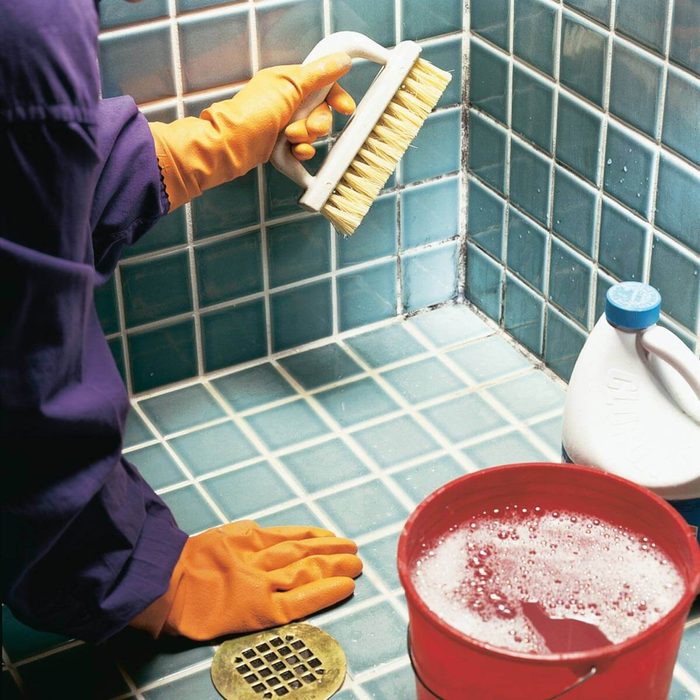
Know the Differences Betwixt Mildew and Mold
Though there are thousands of different types of mold and mildew, they all have two things in common: The first is that their mission on Globe is to digest the organic world effectually them. The second is that they all need moisture and so their little digestive enzymes can go to work. At that place are differences between mold and mildew, but for our purposes, we can call the entire gang mold. Molds are neither plants nor animals. They're microscopic organisms containing enzymes (responsible for digesting and decomposing) and spores (in charge of reproduction). Mold dwells within the fungi kingdom: a realm that includes mushrooms, yeast and other seemingly unsavory characters. Simply the truth is, these decay organisms aren't unsavory at all. Without them, toppled trees, dead animals and fallen vegetables wouldn't decompose. Our land would get piled higher and higher with dead stuff. We wouldn't have foods and medicines like cheese and penicillin. The problems ascend when mold starts chomping away at things we don't want them to—affecting the wait, smell and structural integrity of your house.
9 / xi
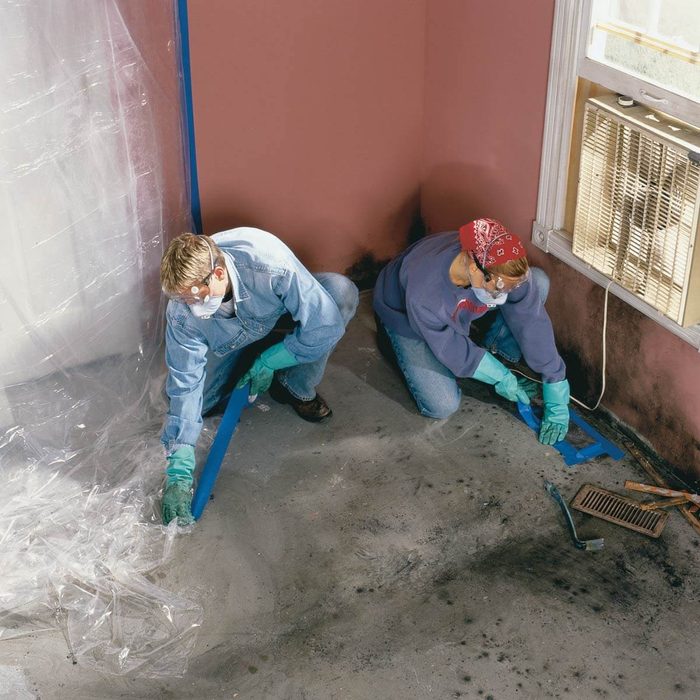
How to Remove Mold
If y'all have to remove mold concentrations or perform any mold removal roofing more than a few square feet, where the musty odour is strong or where you observe extensive water impairment, nosotros recommend that y'all have special precautions. You want to not simply avert contaminating the rest of the house simply as well protect yourself from animate high concentrations of spores and VOCs.
- Wear old wearing apparel and shoes that y'all can launder or throw away after the cleanup work.
- Clothing special N-95 or P-100 respirators, in addition to goggles and gloves.
- Set an erstwhile box fan or a inexpensive new one in a window to ventilate the room while working. Throw information technology out when you're washed cleaning, considering the spores are virtually impossible to clean off. Tape plywood or cardboard effectually the window openings and then the spores can't accident back in.
- Wrap and tape moldy carpeting in 6-mil plastic, and double-bag mold-infested debris in garbage numberless for disposal.
- To control airborne spores, moisten moldy areas with a garden sprayer while you piece of work.
- Turn off your furnace and air conditioner and encompass ducts and doors to contain spores.
- Continue your moisture/dry out vacuum exterior when you vacuum.
10 / 11
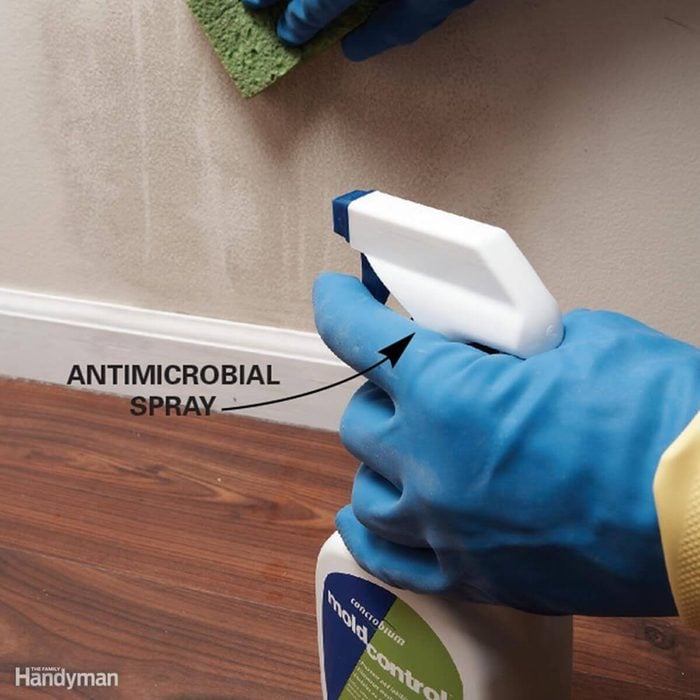
Use an Antimicrobial Spray
Once the moisture has been dried upwardly, make clean and spray the area with an antimicrobial handling to preclude mold from coming back. In basements or other larger areas with musty odors, it may be more than effective to fog the unabridged room. (Concrobium Mold Control is an antimicrobial treatment available at home centers and online that can exist dispensed by spray or with a fogging machine.)
xi / 11
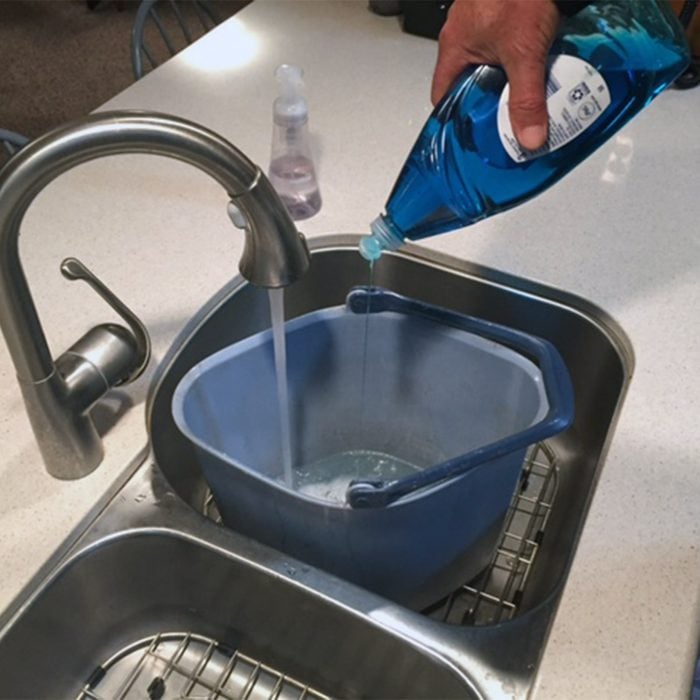
Use Soap and Water to Remove Mold
Removing mold is all-time done with soap and water because it has surfactants, which assistance to remove the mold. Though some say bleach and water tin can be used to remove mold, bleach doesn't have the aforementioned backdrop as soap and water to remove mold.
Originally Published: December 18, 2018
Source: https://www.familyhandyman.com/list/how-to-test-for-mold/
Post a Comment for "How to Know if You Have Mold in Your Body. Hom Test"